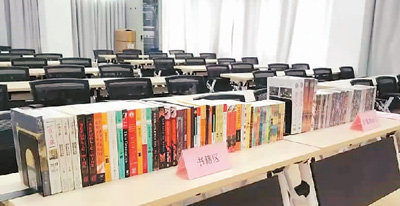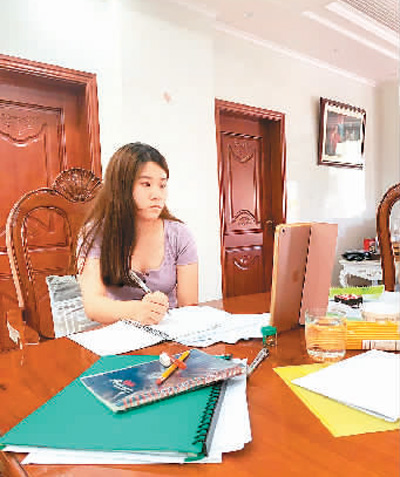

The family of a Brazilian student in Dalian University of Foreign Languages in the city of Dalian in northeast China’s Liaoning province, posed the question, “When will you return home?” to their daughter when the novel coronavirus broke out in China.

Books prepared by Tianjin Normal University for international students.
In order to reassure her family and continue staying in China, the student discussed with all her family. When making video calls every day she would show them her timetable for daily activities including things such as having breakfast and reporting her health condition to her teacher at 7 a.m., doing physical exercises in the mornings, shopping at the supermarket on the campus and studying Chinese in the afternoon, and in her free time watching Chinese films and documentaries.
“Seeing the details of my everyday life here, my family was relieved and agreed on my continued studying in China. I want to thank my university and teachers. It has been their hard work that has ensured our health and safety,” said the student, adding that she wants to do her part to help win the battle against the epidemic together with Chinese people.
In fact, many international students in China have chosen to stay in the country and join the nationwide effort to fight the novel coronavirus disease (COVID-19).
Chinese people have shown much strength and courage during the battle against COVID-19, said Yan Qing, a Sudanese student at Lanzhou University in Lanzhou, the capital of northwest China’s Gansu province.
“I love China,” said Yan, who has witnessed the courage of Chinese medical workers and has felt deeply the resolve of the Chinese people to combat the epidemic together. Yan admires the professionalism of the Chinese government in responding to the public health crisis.
A Kyrgyz student in Dalian University of Foreign Languages, who has been paying close attention to the progress in China’s fight against COVID-19, was amazed by the fast speed of the construction of the Huoshenshan Hospital and was touched by news about people who donated money and face masks without disclosing their names.
When her parents worried about her safety amid the epidemic, she told them that all Chinese people have been trying their best to fight the epidemic and that the Chinese government attaches great importance to people’s health and safety.
“I told my family that I’m very safe in China, and that I believe China will win the battle against the outbreak,” the student said.
“Choosing to study in China is the best decision I’ve ever made,” said the student, who had planned to travel in the country during the winter vacation, but had to cancel her plan due to the epidemic.
“We report our health condition and follow personal protection requirements every day. She explained that various prevention and control measures taken by our university make us feel very reassured. Moreover, she explained that teachers pay not only close attention to their meals and everyday life but also their mental health, which makes them feel warm.
Han Mengqi, a Moroccan student who majors in Chinese in the School of Humanities at Shanghai Jiao Tong University in Shanghai, said China is her second home.

Han Meiqi
Han came to China in September 2019, which marked the first time she studied in a foreign country far from home. But she adapted to the new environment quickly.
“Teachers are amiable, and students always help each other. Every time I attend class, I feel like I’m with family,” Han said.
“The hospitals were built within a very short time, the people who make concerted efforts, the medical workers fighting on the front line… All these people make me love China more,” Han noted.
Since the outbreak of the COVID-19, faculty, students, and alumni of the School of Humanities of Shanghai Jiao Tong University have donated money and supplies via various channels. Han and a Japanese student surnamed Kobayashi in the school are also among the donors.

Kobayashi
“At first, I came to study in Shanghai because I like the Chinese history and culture stories that I saw in Chinese movies. AMfter I came here, I found I like China more and more. Moreover, I hope more Japanese people can get to know more about Chinese culture,” said Kobayashi.
According to Kobayashi, she has witnessed many heartwarming stories during the epidemic. She has been touched by medical workers who got deep marks on their faces left by face masks, rashes on their hands due to frequent contact with alcohol and disinfectant, and not to mention protective suits soaked in sweat.
All these made her want to make an effort to help with the epidemic prevention and control in China, so she and her family donated money to China via the foundation set up by the alumni association of Shanghai Jiao Tong University for assistance in the epidemic.
She hopes all the “angels in white” fighting the epidemic on the front line will be safe, and that all the people in China will unite as one and defeat the virus, Kobayashi said.
Huang Wenfang, a Filipino student at the University of International Business and Economics, said she had never thought that she would take classes online one day.
More than one month ago, after returning to the Philippines for winter vacation, Huang heard the news that China, which she regarded as her second home, was fighting against the novel coronavirus.
Seeing the Chinese government taking prompt actions to contain the virus, and medical workers on their way to help Wuhan, the China epicenter of the epidemic, from various areas of the country, Huang was touched by the solidarity of Chinese people.

Huang Wenfang takes online classes.
The new semester was postponed because of the epidemic. In order to avoid influence on the studies of students, her university launched online classes, according to Huang.
Huang’s new term begun as scheduled on Feb. 17, only the classes were moved to the Internet.
“To help continue our studies, teachers have made great efforts. Although the epidemic is terrible, the hard work of our teachers makes us feel warm and gives us motivation for studying,” Huang disclosed.
“There are a lot of differences between online classes and offline classes, and international students will have to face many challenges, but we will try to overcome difficulties and accomplish learning tasks,” Huang said.
 Fire brigade in Shanghai holds group wedding
Fire brigade in Shanghai holds group wedding Tourists enjoy ice sculptures in Datan Town, north China
Tourists enjoy ice sculptures in Datan Town, north China Sunset scenery of Dayan Pagoda in Xi'an
Sunset scenery of Dayan Pagoda in Xi'an Tourists have fun at scenic spot in Nanlong Town, NW China
Tourists have fun at scenic spot in Nanlong Town, NW China Harbin attracts tourists by making best use of ice in winter
Harbin attracts tourists by making best use of ice in winter In pics: FIS Alpine Ski Women's World Cup Slalom
In pics: FIS Alpine Ski Women's World Cup Slalom Black-necked cranes rest at reservoir in Lhunzhub County, Lhasa
Black-necked cranes rest at reservoir in Lhunzhub County, Lhasa China's FAST telescope will be available to foreign scientists in April
China's FAST telescope will be available to foreign scientists in April "She power" plays indispensable role in poverty alleviation
"She power" plays indispensable role in poverty alleviation Top 10 world news events of People's Daily in 2020
Top 10 world news events of People's Daily in 2020 Top 10 China news events of People's Daily in 2020
Top 10 China news events of People's Daily in 2020 Top 10 media buzzwords of 2020
Top 10 media buzzwords of 2020 Year-ender:10 major tourism stories of 2020
Year-ender:10 major tourism stories of 2020 No interference in Venezuelan issues
No interference in Venezuelan issues
 Biz prepares for trade spat
Biz prepares for trade spat
 Broadcasting Continent
Broadcasting Continent Australia wins Chinese CEOs as US loses
Australia wins Chinese CEOs as US loses